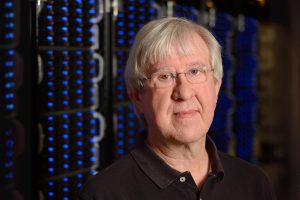
Alex Szalay, the Bloomberg Distinguished Professor of Big Data, has been named a recipient of the 2020 Viktor Ambartsumian International Science Prize. Established in 2009, the prize—named for the famed Armenian astronomer regarded as the founder of theoretical astrophysics in the former Soviet Union—is awarded every two years to outstanding scientists from around the world for significant contributions in the physical-mathematical sciences. It is considered one of the most important prizes in astronomy, astrophysics, and related sciences.
Szalay was recognized for his pioneering work on demonstrating that the dark matter in the universe might be a neutral, weakly interacting particle, and for his contributions to data-driven statistical cosmology. He was nominated by fellow Bloomberg Distinguished Professor Adam Riess, his colleague in the Krieger School’s Department of Physics and Astronomy and a co-winner of the 2011 Nobel Prize in Physics for the discovery that the expansion of the universe is accelerating.
Szalay shares the $200K award with two other recipients, Isabelle Baraffe of the University of Exeter and Adam Burrows of Princeton University. He will receive half the prize money.
As a cosmologist, Szalay focuses on the statistical measurement of the spatial distribution of galaxies and galaxy formation. As a computer scientist, he focuses on the science of big data and data‐intensive computing, significantly expanding our understanding of the structure, formation, and nature of dark matter in the universe.
Szalay is a corresponding member of the Hungarian Academy of Sciences and a fellow of the American Academy of Arts and Sciences. He has received a number of awards and honors, including the 2004 Alexander Von Humboldt Research Award in Physical Sciences; the 2007 Jim Gray eScience Award from Microsoft Research; being named doctor honoris causa of Eötvös Loránd University in Budapest in 2008; and the 2015 Institute of Electrical and Electronics Engineers Computer Society Sidney Fernbach Memorial Award in recognition of his contributions to the development data-intensive computing systems.
Currently, Szalay is applying his big data expertise from astronomy to large-scale problems in cancer immunotherapy.
“Early in my career, cosmology was an order-of-magnitude science, where it was difficult to make accurate predictions. Today, we understand a lot more about the universe, and we have entered the era of precision cosmology. It is breathtaking to see how far we have come in the last 40 years,” he says.
Szalay is expected to officially accept the award during a ceremony in mid-September, contingent upon travel restrictions at that time.